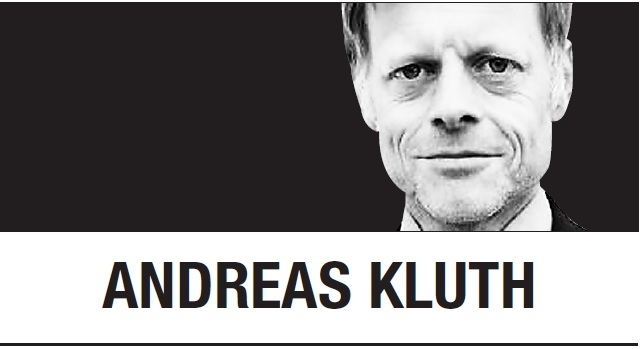[Andreas Kluth] World is feeling angst of liminality
By Korea HeraldPublished : Jan. 18, 2024 - 05:28

The crisis of 2024 “consists precisely in the fact that the old is dying and the new cannot be born; in this interregnum a great variety of morbid symptoms appear.” Symptoms such as extreme polarization, democratic corrosion and neo-fascism in the US and elsewhere, in turn boding conflict, serfdom and war.
Oh, wait. That line above was meant to describe the year 1930. That’s when it appeared in prison notebook number 3, written by Antonio Gramsci, a Marxist philosopher in Benito Mussolini’s Italy whom the Fascists jailed until his death in 1937 to shut him up.
Scholars still puzzle over what Gramsci meant. But the consensus is that he worried as much about the radical leftist turn of the worldwide communist movement as about the spread of fascism in his own country, and soon Germany, Spain and others. In the US today, he might see reflections in the confrontation between the Woke Left and the MAGA Right, and in the despair gripping the rest of us as the nation careens toward an election that may decide the fate of American democracy and global peace.
Gramsci understood that in such stalemates society can’t progress; instead, it hovers in a historical no-man’s land. The new, whatever it is, may eventually turn out dire or fine. But it cannot be born yet, so the present seems morbid.
There’s a word for the angst that accompanies such feelings of suspended or incomplete transition: liminality. It comes from limen, the Latin for “threshold,” and used to be associated with Hermes, who escorts adolescents into adulthood, the middle-aged to senility, the dying to Hades, travelers toward their destination -- and all of us whenever we’ve left one place but not yet arrived at another, and therefore feel acutely vulnerable.
When successfully completed, by contrast, transitions can be exciting and energizing. A joyous threshold crossed in living memory was the fall of the Berlin Wall, which seems inevitable today but took all of us by surprise in 1989. Within a few years, the Iron Curtain was smelted, the Soviet Union dissolved, and Europe and the world reunited. An old (the Cold War) had died, and a new was born. There were still morbid spots -- in the former Yugoslavia or Rwanda, say, or North Korea and Myanmar. But most symptoms looked salubrious.
For years to come, the US, as both the oldest continuous democracy and the only remaining superpower, seemed to offer peace, liberty and prosperity to ever greater stretches of the world. Freedom expanded, as more countries became democracies. Literacy spread. New technologies such as the internet connected rather than threatened us. Problems such as climate change seemed soluble because we knew how to cooperate. Violence was declining. Former enemies such as Russia pledged to “build together a lasting and inclusive peace,” and China committed to a “peaceful rise.” Having passed the threshold of 1989, we settled down in an era of stability, a “long peace.” History, it seemed, had “ended.”
The terrorist attack of Sept. 11, 2001 -- and the reactions and overreactions it caused -- reminded us that this stability was an illusion, but it didn’t yet signal that another old was dying. That only became clear over the past decade. Beginning in 2014, Russia, a permanent member of the United Nations Security Council, smashed the postwar international system by trying to take over a sovereign nation, Ukraine. The US elected a president, Donald Trump, who became an insurrectionist against the American constitution. China turned into a revisionist power, challenging the West and the order it represents. The heating climate and a pandemic exposed our inability to cooperate, even in the face of existential threats.
In parallel to doomsday inklings, though, various Panglossian narratives have developed. Popular in Silicon Valley and other brainy biotopes, these visions emphasize the stunning scientific progress of our species. For every new virus, there’s a new type of vaccine; for every carbon-belching coal plant a new energy source, for every deficit of human ingenuity a new and potentially super-human Artificial Intelligence.
In this version of the new that is to be born, Homo Sapiens won’t expire but either solve problems such as climate change or transcend them, by colonizing other planets and living forever.
The vast majority of us don’t know what to make of this split screen. Will AI save us or cause our “extinction?" Will our democracy endure, or will Trump be a dictator on day one, as he jokes? (And was he joking?) Will the fighting in Europe and the Middle East wind down or spread to other countries, perhaps even engulfing us? Is the new to be born the utopia of Perpetual Peace that we’ve yearned for since Immanuel Kant, or a dystopia of perpetual war?
It’s “precisely this radical uncertainty -- not knowing where we are and what lies ahead -- that gives rise to such existential anxiety,” thinks Jerome Roos, a historian of world-changing crises at the London School of Economics. So the bad news is that 2024 is likely to be unpleasant, and to exhibit morbid symptoms. The good news is that the new will be born eventually, and once we have birthed it, we may yet find it to be, on balance, not all that bad.
Andreas Kluth
Andreas Kluth is a Bloomberg Opinion columnist covering US diplomacy, national security and geopolitics. -- Ed.
(Tribune Content Agency)
-
Articles by Korea Herald




![[Weekender] How DDP emerged as an icon of Seoul](http://res.heraldm.com/phpwas/restmb_idxmake.php?idx=644&simg=/content/image/2024/04/25/20240425050915_0.jpg&u=)


![[Music in drama] An ode to childhood trauma](http://res.heraldm.com/phpwas/restmb_idxmake.php?idx=644&simg=/content/image/2024/04/25/20240425050929_0.jpg&u=)










![[Herald Interview] Mistakes turn into blessings in street performance, director says](http://res.heraldm.com/phpwas/restmb_idxmake.php?idx=652&simg=/content/image/2024/04/28/20240428050150_0.jpg&u=20240428174656)
